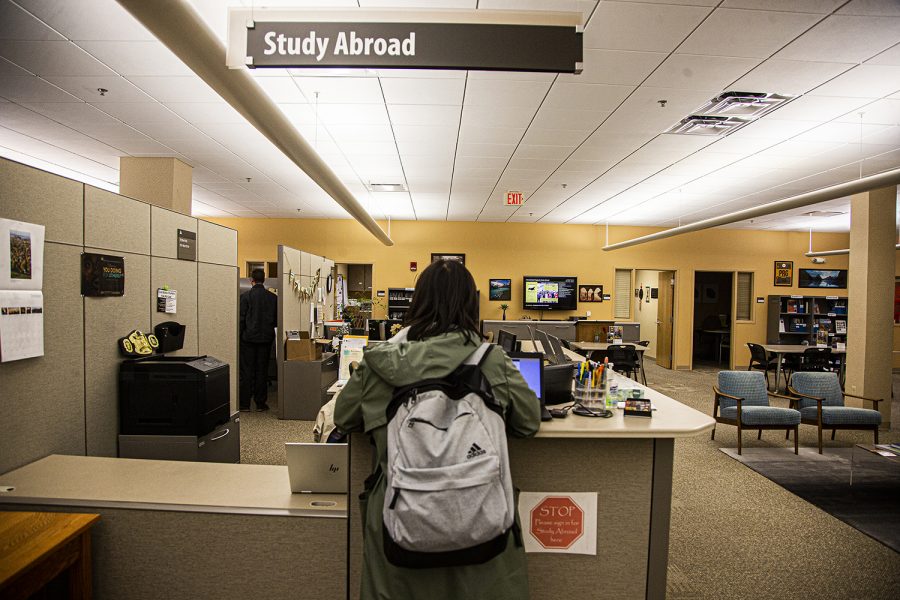University of Iowa anticipates drop in new international-student enrollment for fall 2020 due to COVID-19
The University of Iowa may see a dip in the already declining numbers of new international students on campus for the upcoming school year. While the UI is still planning for a return to normalcy in fall 2020, university officials said current rhetoric surrounding immigration may deter potential students from wanting to study in the U.S.
The University of Iowa Study abroad office is seen on Monday, October 21st, 2019.
April 28, 2020
University of Iowa officials anticipate that recent travel bans and increased xenophobia will exacerbate the trend of declining international-student enrollment for the upcoming school year amid the spread of the novel coronavirus.
UI International Programs Dean Russell Ganim said the university and its Big Ten peer institutions are in a similar position with regard to future international-student enrollment.
“At this point the drop could be significant,” Ganim said. “We do not know for sure yet because everyone is sort of in a holding pattern.”
Ganim said UI International Programs is not anticipating a drop in returning international students.
“We’re sort of in a period of watching and waiting right now,” Ganim said. “… But we do feel that there will be a decline in our new international-student enrollment for the fall of 2020.”
Ganim said that although the number of new international students to enroll at the UI has declined in recent years, international students as a whole account for a large number of the UI undergraduate and graduate population.
According to UI Admissions Office data, international students made up 7.9 percent of total UI enrollment for the fall 2019 semester. Asia is the primary geographic origin for international students at the UI, and accounts for 84.9 percent of the campus international population.
RELATED: Where does Iowa stand in flattening the coronavirus curve?
Ganim said UI International Programs studies and interprets the language of immigration or travel restrictions to determine what the implications may be for UI students.
President Trump signed an executive order limiting immigration into the U.S. for 60 days on April 22 in response to the global spread of COVID-19.
Ganim said this order, additional immigration bans, and xenophobic rhetoric could create a chilling effect and deter future international students from choosing to study in the U.S.
Michael Bortscheller, UI associate director of International Student and Scholar Services, said his department does not serve immigrant students or statuses that would be directly affected by the order, which limits employment-based statuses.
Bortscheller noted that feelings of exclusion, however, could affect UI international-student enrollment.
Center for Diversity for Enrichment Executive Director Nadine Petty said the number of new international students studying in the U.S. and at the UI decreased in 2017.
While it’s difficult to gauge all the factors driving this decline, Petty said she suspects Trump’s anti-immigrant campaign rhetoric and election played a role.
“There was a surge of international students starting to question the safety of the United States and questioning whether or not they would be welcomed if they came to America to study,” Petty said.
Petty said the new travel ban could impact international-student enrollment for fall 2020 in a similar way.
“Absolutely the travel ban I think sends a message,” Petty said. “It might not directly have anything to do with it in the sense that the travel ban does not exclude students from coming into another country to study, but it does send a message, it does create an optic, and it does create some doubt within international communities as to whether or not they would be safe and accepted in the United States.”
Bortscheller said that, although it’s quite possible there may be a decline in enrollment, UI International Student and Scholar Services is still planning and preparing as though everything will be back to normal in the upcoming academic year — at least with the immigration system.
In regard to tuition, Bortscheller said international students at the UI pay the same amount as out-of-state students. UI nonresident students currently pay $31,793 in tuition and fees.
RELATED: Iowa’s public university leaders to share COVID-19 revenue losses with regents
Ninety-seven percent of undergraduate international students’ and 31 percent of graduate international students’ fund their education through personal and family funds, according to a report on fall 2019 UI enrollment numbers.
One percent of undergraduate international tuition and 65 percent of graduate student tuition is funded through the UI, though the report denotes that “relatively few graduate students receive aid that is not, in effect, employment related.”
“We very much value the contribution of our international students and scholars,” Ganim said, “we want to celebrate their achievements and welcome them to our campus because they enrich us academically and culturally.”



